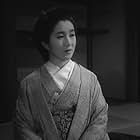Kinuyo Tanaka is a lawyer. When Mitsuko Miura, an old school friend, is being tried for murder of her infant, she serves as her defending attorney. The prosecutor is her brother-in-law, Kappei Matsumoto, who put her fiancee in prison under the militarist government, and paid for her education. He is a cold, sere man, who espouses law on its own terms. Under the new swelling of democracy and liberalism, there are calls for his dismissal. He cites Tanaka's obligations to him. If he can ride out the current moment, he hopes to be appointed a chief prosecutor. He asks, no, demands, that she throw the case.
Kenji Mizoguchi's first post-war film, and the fifth of fifteen he would make with Miss Tanaka, shows signs of being an effort to make peace with the American occupation, of expiating the rah-rah nationalism of the films he made under the censors during the War. He was not, of course, the only director doing this: Kurosawa, Kinoshita, and undoubtedly others whose works I am not familiar with, were doing the same. Given his interests, it is hardly surprising that he made it a feminist tract.
It is weakened by Matsumoto's character. He claims that the law is an absolute in itself; yet he uses it and all means available to further his own interests. His arguments are straw man arguments, devoid of compassion or any humanity. Even though we do not hear the actual verdict, our sympathies are all with Miss Tanaka, and her victories outside the courtroom presage her inevitable victory within the well.
As stereotypical as Matsumoto's role is, and as fiery and admirable Miss Tanaka's, the best performance is given by Miss Miura. Humble, ashamed, weeping in court during Miss Tanaka's summing-up, she holds her hands in front of her face, denying the audience a chance to see her, demanding we must look. Mizoguchi's direction of her is simple and brilliant, and demands that, in the world of this movie at any rate, the purpose of the law must be to succor the weak, to protect the helpless, and to make a world in which they can be strong and moral.

























